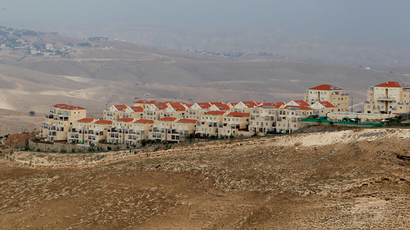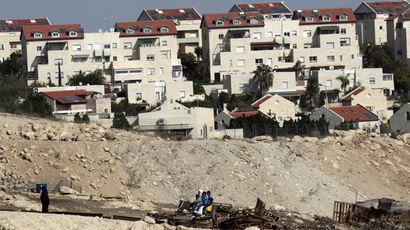Europe 'losing patience' over Israeli settlement policy – EU envoy

The EU Ambassador to Israel has warned that a growing number of EU states are dissuading their citizens from doing business with companies registered in Israeli settlements; France, Italy and Spain have already joined the trend.
Ambassador Lars Faaborg-Andersen told a business seminar organized by the Geneva Initiative on Friday that six European nations have already issued warnings to the Israeli government over expanding construction of settlements beyond the Green Line.
EU member states “are losing their patience with concerns not being treated [seriously]," by Israel, Lars Faaborg-Andersen said.
"The EU is more consistently implementing existing policy, and taking further steps to disengage from the settlements," said the ambassador, and warned that in case settlement construction does not stop, even more EU member states will issue an advisory not to do business with business in the settlements.
The governments of five of the largest EU economies: Germany, France, Italy and Spain, UK, as well as the Netherlands have urged businessmen nationwide to stop investing into Israeli settlements in eastern Jerusalem, the Golan Heights and the West Bank.
The international community regards all Israeli settlements built on occupied Palestinian land as illegal.

These settlements “constitute an obstacle to peace” in the Israel-Palestinian conflict and are a major stumbling block on the way to reaching a solution to the conflict, maintains a statement published on the Spanish Foreign Ministry's website on Friday.
“Potential buyers and investors should know that a future peace accord between Israel and the Palestinians, or between Israel and Syria could have consequences both for properties acquired and for economic activities promoted in said settlements,” the Spanish statement said. “In case of litigation, it could be very difficult for member states to guarantee the protection of their interests.”
EU investors “should be aware of the potential implications for their reputation” when dealing with entities based in Israeli settlements, Madrid warned, and called to “seek adequate legal counsel before moving ahead” with such investments.
“The current situation could lead to disputes over land, water, quarries or natural resources that were acquired or in which money was invested,” read the Spanish Foreign Ministry’s statement. “Companies must take into account that [financial activity in the settlements] is liable to lead to their involvement in breaking international law and violating human rights,” the statement continued.
The statement from the Spanish government “is not intended as a call for a boycott in any way, or to limit economic cooperation between Spain and Israel within its internationally-recognized borders,” the Spanish Foreign Ministry’s spokesman Carlos Entrena Moratiel told the Jewish Telegraphic Agency (JTA).
“We have no intention of harming commerce or cooperation with Israel inside its internationally-recognized borders,” Spanish Foreign Ministry officials told the Spanish news agency EFE, referring to the 1967 Israeli borders.
Stopping short of calling for such entities to refrain from investing in these areas, the statement advised them to “seek adequate legal counsel before moving ahead” with such plans.
The French Foreign Ministry issued a similar warning last Tuesday, reminding its citizens that the West Bank, East Jerusalem, Gaza sector and the Golan Heights are territories that have been “occupied by Israel since 1967,” and therefore doing business in the settlements, deemed by international law as illegal, is a risky undertaking.
Paris also advised French businessmen to seek “appropriate legal advice” before proceeding with any business activities.
The French warning to businessmen operating in Israel mimicked a British one issued in December 2013. These are also echoed in similar warnings issued by the governments of Germany and Netherlands.














